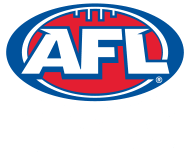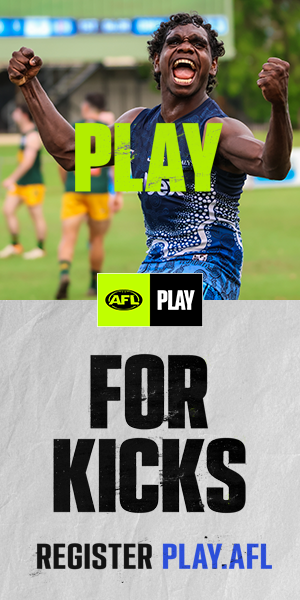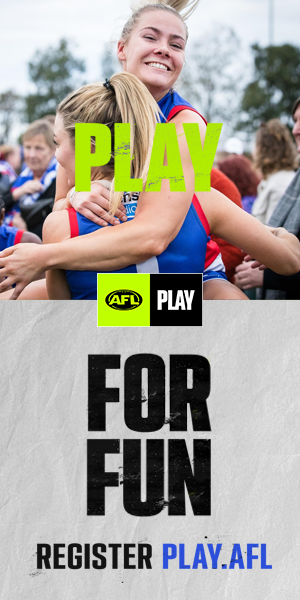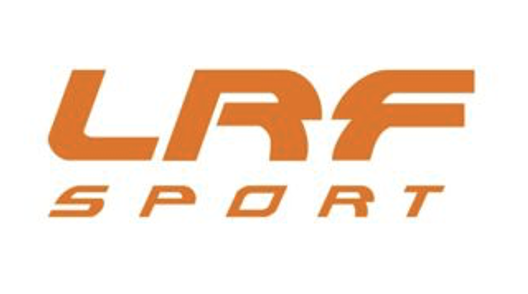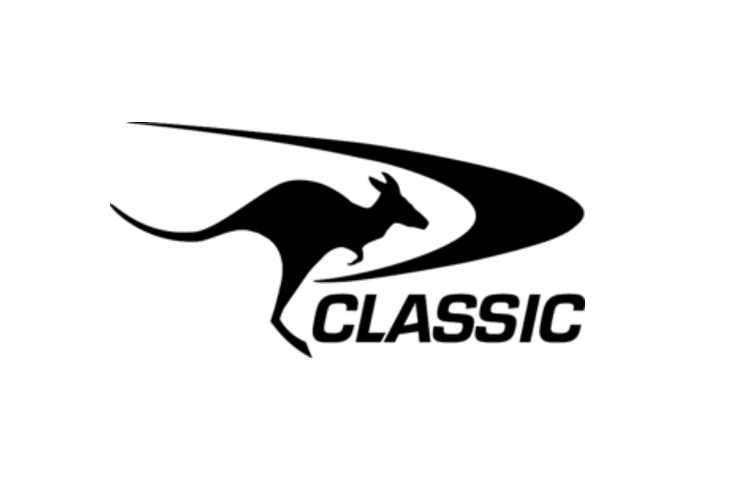There are a lot of great football stories that begin in an unlikely fashion, and then there is the Darrel Dunnett story. It belies belief. Invited to a local game, he arrived thinking he was a going to watch rugby league. It was the only game he knew in Rockhampton. He’d never heard of AFL. Now 50 years on he’s an AFL pioneer in the Capricornia region, and a legend at not one club but two.
It was 1973. Dunnett, a born-and-bred Rockhampton boy, was 23 when he was invited by a mate of a mate to “some paddock with barbed wire around it and four trees at each end” in an area of town he didn’t know well.
“What’s this?” he asked, quickly realising it wasn’t rugby league. “It’s Australian rules,” said Gary Cini, a local stalwart. The only game, he said. Three years later Dunnett was captain-coach of a Wandal Bulls senior premiership side. Among his side was long-time good mate Cini, who would go on to play an important role in the establishment and development of the code. A mate of a mate.
Dunnett went on to become one of the greats of Capricornia football. A three-time premiership captain-coach and 50-time Capricornia representative before he turned his hand to off-field matters and the development of the code in the region.
But, as they say, wait, there’s more. In his first game of football Dunnett didn’t last long. “They said to me ‘you’re pretty tall – you can play in the ruck’. So, not knowing what I was doing, I charged in and was ko’d,” he said.
It was all part of a new thing for Rockhampton. Of three teams that made up the competition in year one, only the Parkhurst Panthers made it to year two. The Allenston Rovers folded despite winning the inaugural premiership, and with them went Depot Hill. A group of keen Depot Hill people, Cini among them, formed the Wandal Bulls in 1973, while another new club, Gladstone Brothers, completed the line-up.
Dunnet had come from an entirely different sporting background. He was from a boxing family. His uncle Billy Dunnett was an Australian champion and his uncle Erwin Dunnett was a Queensland champion. He had 20 fights himself while also playing junior rugby league but admits he “wasn’t good enough”.
He also drove saloon cars at the local speedway. His XL Falcon became famous at the Rockhampton Showgrounds, carrying a message to the locals down the side … ‘Support Aussie Rules Football’.
As a local tribute said of Dunnett: “(He) was the ‘Mr.Football’ of football in Rockhampton for 15 years …. (he) successfully moulded his side into a tight and all-teamwork unit with the accent on handpassing.”
He went on to play more than 250 games for Wandal from 1973-85, and every representative game the League played in that time. Taking over as captain-coach in 1976, he won a flag first up before stepping down in 1977 to work under Peter Newcombe, a teacher who had moved from QAFL club Western Districts. He was back in charge when the Bulls won two more flags in 1978-81 and was club president for most of the 1970s.
There were the occasional short-term retirements – “I had more comebacks than John Farnham” – and he was still playing Reserves at 41.
Off the field, too, he was a ‘doer’. Under the Dunnett direction, Wandal were the first senior club to form a junior club before he later formed the junior league. His strong and critical junior push came after a little prompting from then QJAFL secretary Frank Sargeant, who invited him to Brisbane for a meeting, He made the 700km trip to Brisbane in his famous XL Falcon and returned with it full of footballs and other gear.
Jumpers were hard to find so he bought some old army jumpers, cut the sleeves off and planned to dye them in the club’s colors. But the original plain blue would not ‘take’ over the army green so they changed to maroon and sewed on a gold sash. In 1982, when they ran into problems producing any more maroon and gold jumpers, they had to change colors again. Offered the choice of any AFL club, they went with the closest thing – the brown and gold of Hawthorn.
It was a choice that thrilled Dunnett, who was a one-eyed Hawks fan. He loved champion centre half back Peter Knights, who wore #24 and later was the first coach of the Brisbane Bears. “Our jumpers were always numbered 1-20, or 1-22 now, so I did the next best thing – I wore #14 all my career,” he explained, lucky enough to attend the 1978 AFL grand final, when the Hawks won their third flag, and the 1985 grands final, when Leigh Matthews played his last game and Knights did likewise in the reserves after an injury-plagued final season.
He also established a Saturday-morning schools competition, often driving the streets to pick up would-be players. Another trip to Brisbane saw him return with six sets of jumpers, footballs, coaching manuals, and anything else he could get his hands on. He recruited some teachers, helped guide them in fundamental coaching principles, and soon had Rockhampton High, North Rockhampton High, St. Stanislaus College, St. Brendan’s College, Christian Brothers College, and Rockhampton Grammar on board. It was massive and led to continued growth through the 1980s.
Dunnett was strongly in favour of the League developing a headquarters ground, and remembers vividly a time when an Under-17 team from Brisbane travelled to Rockhampton to play the locals. “They wouldn’t get off the bus – the ground was terrible, there was no water and no amenities. If we were going to amount to anything we had to get a decent ground.”
After a various unsatisfactory offerings from the council and limited interest subsequently from other clubs Dunnett accepted a new plot on behalf of Wandal at what in 1983 became Stenlake Park, built from a paddock under the direction of fellow 2023 Hall of Fame inductee Bernie Gottke, who had been recruited to the game by Dunnett.
Changing rooms were added in 1985 ahead of continued improvements since then, among them have been lighting, a coloured scoreboard and shade structures over the grandstands which have made it Rockhampton’s No.1 venue.
In 1995 the Wandal Bulls became the Glenmore Bulls after moving to the new ground in Glenmore, and in 2003 they would adopt the maroon, blue and gold of the Brisbane Lions, while keeping the traditional bull instead of the lion. But by then Dunnett was no longer calling the shorts.
In a move that shocked many locals, Dunnett switched his loyalty to the Panthers in 2001 following an approach from the League. It was a rescue mission. They hadn’t won a game in any grade in five years. They had no players and were in debt. The next step was extinction.
“It was a really tough decision (to go to Parkhurst) because we hated them. It was like Carlton v Collingwood. It caused a bit of grief with some Wandal people but I figured this was a foundation club of the League – a three-time senior premiership club (in 1980-85-93). You had to take a big-picture view and consider what was best for Rocky football. We couldn’t let them fold without at least trying to help,” he said.
He coached the club for two years and served as president for four years before they won the flag in 2007 as the Rockhampton Panthers. A job well done.
Satisfying, too, has been the efforts of three AFL Capricornia players drafted to the AFL and the success of one-time Rockhampton field umpire Ben Ryan.
First, there was Rockhampton Brothers’ Paul O’Shea, who was drafted to the Western Bulldogs before a serious hip injury cut short his career without a chance at the top level. Then Glenmore’s Gavin Urquhart, who played 41 games at North Melbourne from 2008-12. Ex-Glenmore soccer convert Zac Smith played 124 games with Gold Coast and Geelong and represented Australia in the 2011 International Rules series, and umpire Ryan officiated in 121 AFL games and 144 AFLQ games, including four grand finals.
Another ex-AFL Capricornia boy, Andy Colenso, was a member of Coorparoo’s 1984 QAFL premiership to begin a long association with community football in south-east Queensland.
A plasterer by trade, Dunnett is a Life Member of the Bulls and the Panthers and a 2002 recipient of the AFL Merit Award. He ‘took the fifth’ when asked where his loyalties would be if his two clubs were playing in a grand final? “Let’s just say my son (Jason) played in four junior premierships with the Bulls and in the Panthers’ only senior premiership so I barracked for whoever he was playing with,” he said.
That Dunnett’s only son in named Jason is another story. He is named after Hawthorn champion Jason Dunstall and it’s not just an arms-length thing. “When we were trying to save the Panthers I met a guy in Brisbane who put me in touch with him (Dunstall). I asked if he could help and he could not have been more accommodating. We flew him for a sportsman’s night which was a huge success and went a long way to getting the club back on its feet,” he said.
Dunnet’s induction to the Queensland Football Hall of Fame will be a thoroughly deserved recognition for one of the greats of football in regional Queensland, but with Dunstall set to host the function the ceremony itself might be secondary to the opportunity to introduce his Jason to the game’s biggest and best Jason.
